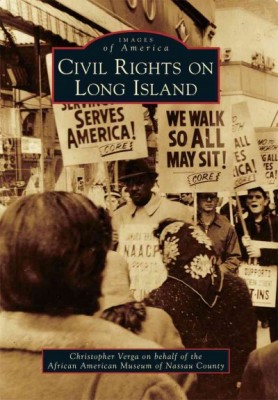| Civil Rights on Long Island Contributor(s): Christopher Claude Verga on Behalf of th (Author) |
|
 |
ISBN: 146711717X ISBN-13: 9781467117173 Publisher: Arcadia Publishing (SC) OUR PRICE: $22.49 Product Type: Paperback - Other Formats Published: October 2016 |
| Additional Information |
| BISAC Categories: - History | United States - State & Local - Middle Atlantic (dc, De, Md, Nj, Ny, Pa) - Social Science | Ethnic Studies - African American Studies - Literary Collections | American - African American |
| Dewey: 323.097 |
| LCCN: 2016941980 |
| Series: Images of America |
| Physical Information: 0.8" H x 6.4" W x 9.2" (0.70 lbs) 128 pages |
| Themes: - Ethnic Orientation - African American - Topical - Black History |
| Descriptions, Reviews, Etc. |
| Publisher Description: Long Island has been in the corridors of almost all major turning points of American history, but Long Island has been overlooked as a battleground of the civil rights movement. Since early colonization by the English settlers in the 17th century, the shadow of slavery has bequeathed a racial caste system that has directly or indirectly been enforced. During World War II, every member of society was asked to participate in ending tyranny within European and Asian borders. Homeward-bound black soldiers expected a societal change in race relations; instead they found the same racial barriers they experienced prior to the war. They were refused homes in developments such as Levittown, denied mortgages, and had their children face limited educational opportunities. Collective efforts from organizations such as Congress of Racial Equality (CORE) and the National Association for the Advancement of Colored People (NAACP) employed civil disobedience as a tactic to fracture racial barriers. |
Contributor Bio(s): Christopher Claude Verga on Behalf of the African: - Christopher Verga is a local historian and American history lecturer at Suffolk County Community College. Christopher utilized images from local historical societies, private collections, and the African American Museum of Nassau County to create a narrative of civil rights challenges and triumphs. These photographed defining moments have become a testament to the future of an increasingly diverse suburb. |